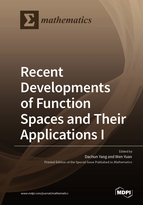Recent Developments of Function Spaces and Their Applications I
A special issue of Mathematics (ISSN 2227-7390). This special issue belongs to the section "Functional Interpolation".
Deadline for manuscript submissions: closed (30 May 2022) | Viewed by 24813
Special Issue Editors
Interests: harmonic analysis; function space; boundedness of operators
Special Issues, Collections and Topics in MDPI journals
Interests: harmonic analysis; function space; boundedness of operators
Special Issues, Collections and Topics in MDPI journals
Special Issue Information
Dear Colleagues,
As one of the central topics of modern harmonic analysis, the theory of function spaces has found wide applications in various branches of mathematics, such as harmonic analysis, partial differential equations, geometric analysis, and potential analysis, and has, for a long time, received a lot of attention. The development of various function spaces on different underlying spaces provides many new working spaces for the research of other related analysis fields.
This Special Issue, entitled “Recent Developments in Function Spaces and Their Applications I”, is devoted to collecting research on the recent progress in the theory of function spaces, as well as on their applications in harmonic analysis, boundedness of operators, or partial differential equations. We would like to invite original research articles that provide new results in this subject. Potential topics can be related to, but are not limited to, the keywords listed below.
Prof. Dr. Dachun Yang
Prof. Dr. Wen Yuan
Guest Editors
Manuscript Submission Information
Manuscripts should be submitted online at www.mdpi.com by registering and logging in to this website. Once you are registered, click here to go to the submission form. Manuscripts can be submitted until the deadline. All submissions that pass pre-check are peer-reviewed. Accepted papers will be published continuously in the journal (as soon as accepted) and will be listed together on the special issue website. Research articles, review articles as well as short communications are invited. For planned papers, a title and short abstract (about 100 words) can be sent to the Editorial Office for announcement on this website.
Submitted manuscripts should not have been published previously, nor be under consideration for publication elsewhere (except conference proceedings papers). All manuscripts are thoroughly refereed through a single-blind peer-review process. A guide for authors and other relevant information for submission of manuscripts is available on the Instructions for Authors page. Mathematics is an international peer-reviewed open access semimonthly journal published by MDPI.
Please visit the Instructions for Authors page before submitting a manuscript. The Article Processing Charge (APC) for publication in this open access journal is 2600 CHF (Swiss Francs). Submitted papers should be well formatted and use good English. Authors may use MDPI's English editing service prior to publication or during author revisions.
Keywords
- Lebesgue space
- Morrey space
- Orlicz space
- Sobolev space
- Hardy space
- BMO
- John–Nirenberg space
- Besov space
- Triebel–Lizorkin space
- Campanato space
- Riesz transform
- Calderón–Zygmund operator
- multiplier
- trace
- boundedness
- interpolation
- embedding
- dual
- wavelet
- frame
- weight
Benefits of Publishing in a Special Issue
- Ease of navigation: Grouping papers by topic helps scholars navigate broad scope journals more efficiently.
- Greater discoverability: Special Issues support the reach and impact of scientific research. Articles in Special Issues are more discoverable and cited more frequently.
- Expansion of research network: Special Issues facilitate connections among authors, fostering scientific collaborations.
- External promotion: Articles in Special Issues are often promoted through the journal's social media, increasing their visibility.
- e-Book format: Special Issues with more than 10 articles can be published as dedicated e-books, ensuring wide and rapid dissemination.
Further information on MDPI's Special Issue polices can be found here.







